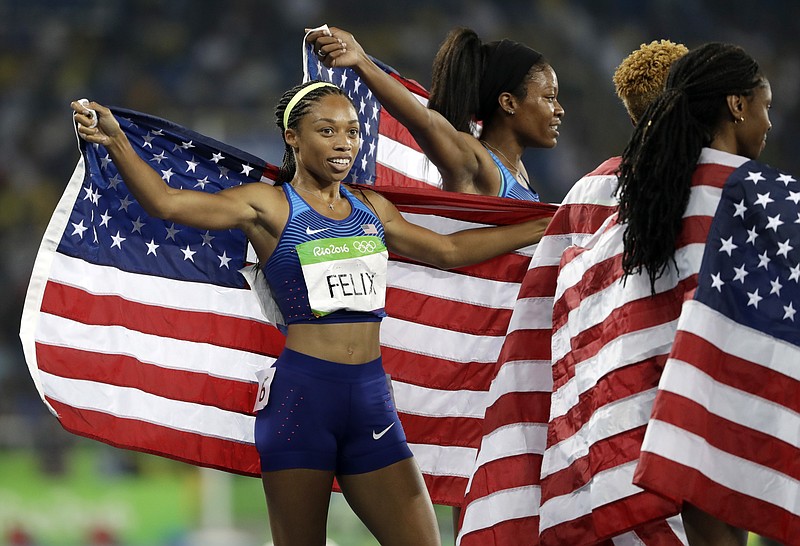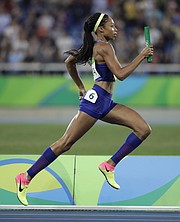The Rio Olympics may have been the finest hour in American women's sporting history. The U.S. women won 27 gold medals - nine more than the U.S. men, and eight more than the entire Russian team.
Out of the 121 total U.S. medals, 61 were won by women. That's enough to rank them - as if they were competing separately as their own stand-alone country - third out of every nation in Rio.
In times like these, it is good to call out our heroes by name:
- Simone Biles, with four gold medals in gymnastics.
- Katie Ledecky, four gold medals in swimming, and two world records. And she's 19.
- Allyson Felix, the winningest woman in the history of Olympic track and field.
- Simone Manuel, the first black woman to win gold in an individual swimming event.
- Ibtihaj Muhammad, a fencer who became the first U.S. athlete to compete while wearing a hijab. She won bronze.
For 16 days and nights, we got to watch such athletic greatness every night on prime-time television.
It sure was nice while it lasted.
What made the Rio Olympics so special wasn't just the performance from the U.S. women. It was the fact such female-athletic greatness was televised.
Most televised sports are male sports, with women relegated to the sidekick role of busty cheerleader, commercial sex object or sideline interviewer. The athletic glass ceiling is a flat-screen TV: Athletic women are nearly invisible to TV networks in the months between summer and winter Olympics. Broadcasters orbit around a meat-and-three diet: football, followed by baseball, basketball and golf.
Rio ended one week ago. In the seven days that followed, television programmers - ESPN, TBS, the major and minor networks - planned to broadcast a total of 148 sporting events. (That's according to my count of the "Sports On Air" section of this newspaper's sports section.)
A whopping 131 of those were male sports. Pre-season football. High school football. Soccer. Auto racing.
Of those 148, only 11 were entirely devoted to women.
(There were six televised horse races, which means women just barely edged animals in televised attention.)
"That's awful," my daughter said.
Such gross disparity is consistent in American broadcasting. The recent report "It's Dude Time" - written by Cheryl Cooky, Michael A. Messner and Michela Musto - discusses research that examined the presence of women's sports on ESPN and Fox Sports.
"Each program featured women's sports coverage less than 1 percent of the time," the report reads.
And we haven't even started football season yet.
It's not as if women's sports are dull and dainty. Rio proved that. Look at the beloved women's World Cup team. Or Serena and Venus. Or ultimate fighting champ Ronda Rousey. Or Monica Abbott, who just became the first pro softball player to sign a $1 million contract. For all the attention given the U.S. men's basketball team, the women's was even dreamier: winning their sixth consecutive gold medal, and a stunning 49th straight Olympic game.
"I learn more from the WNBA," Golden State superstar Draymond Green told Sports Illustrated. "They know how to dribble, how to pivot, how to use the shot fake."
During football season, try watching one female sport for every two football games. Even on a 4:1 ratio - four football games for one female event - you won't do it. You can't do it. And the annual lingerie bowl doesn't count.
Why such televised inequity?
Is it fear?
Insecurity?
"The Stronger Women Get, the More Men Love Football," is the title of Mariah Burton Nelson's 2001 book on sexism and sports culture.
It is a feast-or-famine type of broadcasting. NBC devoted nearly 60 percent of its airtime to women's events at Rio, according to the AP. Yet 24 hours later, athletic women vanish from our TV screens.
It's strange, sexist television: broadcasters believe we viewers want to watch professional women in the summer Olympics every four years, but not every Sunday. That's not sports coverage; that's pageantry.
David Cook writes a Sunday column and can be reached at dcook@timesfree press.com or 423-757-6329. Follow him on Facebook at DavidCookTFP.

